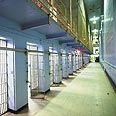
The interview was cited by the website of the National Council of Resistance of Iran (NCRI), an umbrella organization for Iranian opposition groups in exile.
According to the NCRI, Moraqeh-Abed added in the interview that "it is not possible to accommodate 'the cultural and disciplinary' needs of this many prisoners."
The NCRI noted that "everyday 2,600 people are sent to prison; thus, in a year the figure grows to 1 million," a figure described as an "unprecedented world record."
The NCRI added in its statement: "Obviously, the actual number of detainees in Iran is much higher than the official figure since it does not take into account various unofficial penitentiaries and prisons.
"In particular, the regime has stepped up suppression to an unprecedented level and street arrests have increased in order to combat the rising number of popular demonstrations and uprisings."
Calling for human rights organizations to take up the plight of Iranian prisoners, the NCRI drew special attention to political prisoners jailed for their opposition to the Iranian regime.
'Help the NCRI'
In 2002, the offices of the NCRI were shut down in Washington DC, after the State Department said the organization was a front for the People's Mujahedin of Iran, a militant Iranian opposition group dedicated to toppling the Iranian government.
Since then, a number of politicians and analysts in the West have said that the NCRI should be made legal again, as it was a crucial representative of Iranian groups working to overthrow the government of Ayatollah Khameini and President Ahmadinejad.
On Saturday, a British member of the House of Lords, Lord Fraser, called on the British government to take the NCRI off the list of banned groups. Fraser was reported by the NCRI as saying that he had been threatened by what appeared to be Iranian government agents, due to his support for the NCRI.
NCRI President-Elect Maryam Rajavi said Saturday that she "welcomed the adoption of a resolution by the UN Security Council against the mullahs' regime," saying it was "the first necessary step towards preventing the ruling religious fascism in Iran from obtaining a nuclear bomb."















